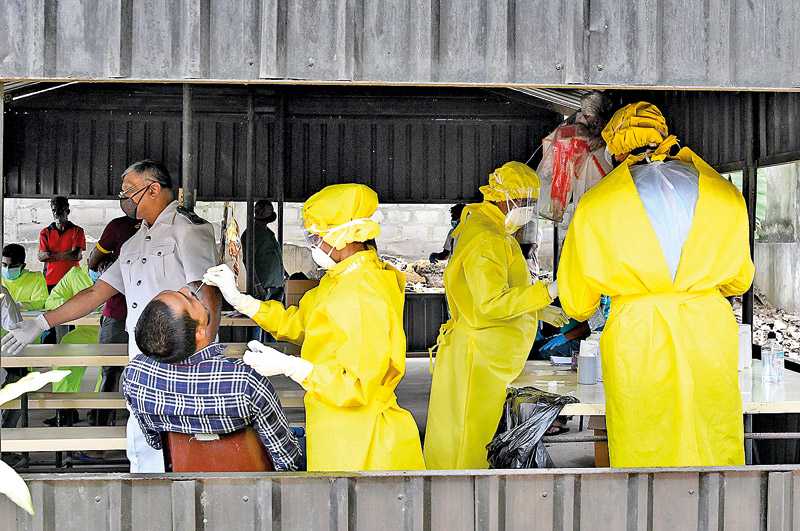Thursday Feb 19, 2026
Thursday Feb 19, 2026
Thursday, 28 January 2021 01:02 - - {{hitsCtrl.values.hits}}

When there is a population of 22 million and vaccines sufficient for 300,000, it is logical to give priority to frontline workers (health and other) who are most exposed to risks of infection. They are exposed by the nature of what they do for all of us. If they get sick, everyone suffers, not just them. There won’t be trained people who can care for the sick and bring the pandemic under control – Pic by Shehan Gunasekara
 Comments on the efficacy, risks, etc. of vaccines should be made by those with specialised knowledge on the subject. But those of us working at the intersection of economics, law and technology can make useful contributions as well.
Comments on the efficacy, risks, etc. of vaccines should be made by those with specialised knowledge on the subject. But those of us working at the intersection of economics, law and technology can make useful contributions as well.
What kind of good is vaccination?
There is a limited stock of vaccines available in a country at a given time. A vial of vaccine is not a public good that cannot be sold for a price. One person getting a jab means there is one less for another. It can easily be given or denied. It is a private good that can be supplied through the market.
But vaccinations have strong positive externalities. The true benefits come to individuals (and countries) only when a significant majority of the population (or countries with which the country is interacting) are vaccinated. Benefits flow not only to the person getting the vaccination, but to others in her environment.
Vaccinations can be sold through the market, but it is better if at least some quantity is given away free to those who are hesitant to pay. In fact, if there is resistance to vaccination for whatever reason, additional inducements or penalties can be justified.
How should limited stocks be allocated?
When there is a population of 22 million and vaccines sufficient for 300,000, it is logical to give priority to frontline workers (health and other) who are most exposed to risks of infection. They are exposed by the nature of what they do for all of us. If they get sick, everyone suffers, not just them. There won’t be trained people who can care for the sick and bring the pandemic under control.
Who is next in priority? Most societies would privilege those most at risk, in the case of COVID-19 those who are elderly with other illnesses. The expected short duration of vaccine effectiveness makes this a relatively easy choice.
Those engaged in processing food perform essential functions. Infections in other countries show that such workers are facing high risks. Should they be next in priority after frontline health workers? What about those who work in close proximity in factories to keep the exports going? Without them, we may not have the resources to fight the pandemic.
What about persons such as politicians and religious functionaries whose functions require extensive human interactions and thus place them at some risk? They may be distinguished from frontline health workers who are compelled to expose themselves to risk.
Should it be possible to pay?
The various vaccines that are being made available are priced from around $ 3 (AstraZeneca-Oxford/Covishield) to $ 33 (Moderna). Bulk purchases by governments and programs such as Covax will make some vaccinations free of charge to citizens. Should those willing to pay be allowed to obtain vaccines on a parallel track?
For example, an export firm may be willing to spend its own funds to protect its workforce. As long as it does not disturb the priority list for free vaccines, is there any harm?
If vaccination for payment is acceptable for companies, why not for individuals? Those who wish to travel may require vaccines even if they do not fall within priority categories. It may be cleaner to allow them access to a payment-based option, than make case-by-case determinations on jumping the queue. Should the pay option be limited for those with cause as above, or simply open to anyone who is willing to pay?
This is how the Sri Lankan healthcare system works anyway. Those willing to pay can reach the specialists of their choice, technically with shorter waiting times, than those who go through the free channels in State hospitals.
The same with hospital care. Those wanting the conveniences of attached bathrooms and TVs, can use private hospitals. Not perfect, but works. And in conditions of resource constraint, it may be the sensible option if the free channel can be protected from harm by the pay option.
Vaccination and trust
Injecting one’s body with foreign substances requires trust in science and scientists. It is because vaccinations are risky that extensive trials are conducted, and rigorous approval procedures have been put in place. Government officials are instructed on how to communicate about vaccinations, specifically about the associated and unavoidable risks and unknowns.
There is some percentage of the populace that is fearful of injections and untrusting of science. There are also those in the media who seek to profit by creating distrust, for example by peddling patent falsehoods about microchips being injected along with the vaccines. Stories about genes being altered are also in this category.